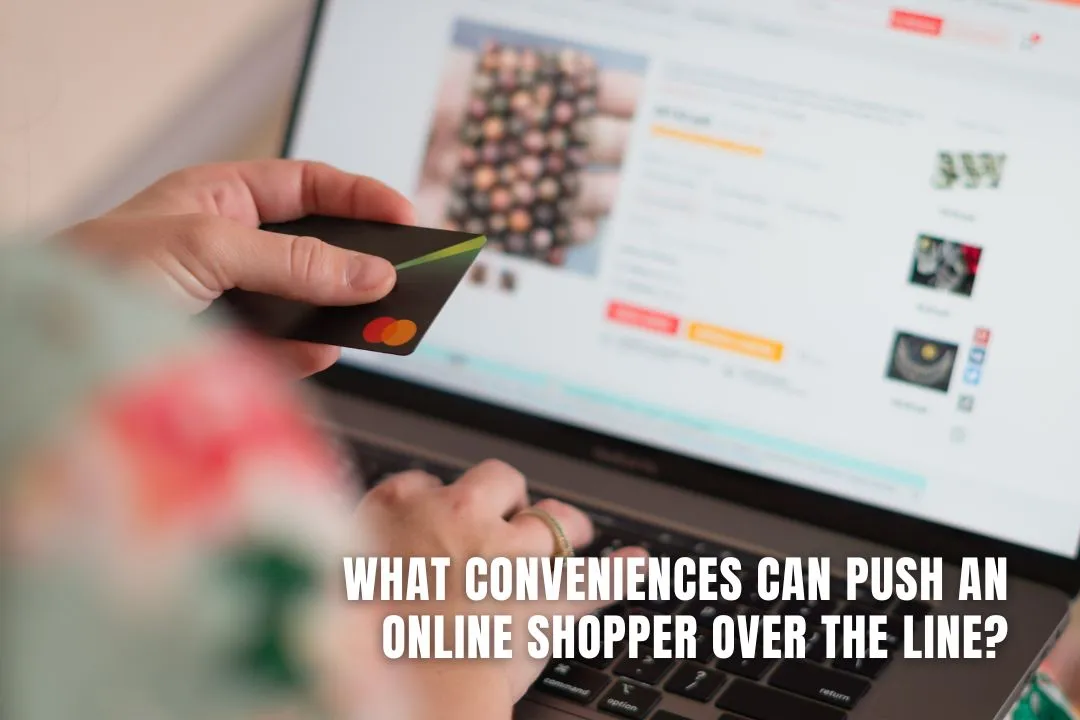What Conveniences Can Push An Online Shopper Over The Line?
January 10, 2025

There are huge benefits and drawbacks to selling products online. The obvious benefits include the ability to sell a great deal of products at one time, to appeal to a wider market, and perhaps to avoid even renting a bricks-and-mortar retail store. There’s a reason the high street has been on the decline for years since high-speed internet came into effect for most consumers.
Yet while the drawbacks are less obvious, they’re still a constant presence. For example, it’s very easy for people to window shop online products and never buy, as even people visiting a retail store might buy something small so the trip doesn’t feel wasted. Moreover, there’s more competition on the online marketplace than ever before, and you may be competing with businesses many thousands of miles away, not just in your town.
Overall, it’s worth having an online presence still, but that means you have to be practical about the conveniences that help push hesitant shoppers over the line. In this post, we hope to help you with that and more:
Key Takeaways on Conveniences that Push Online Shoppers Over the Line
- Delivery Estimates Matter: Clear delivery timelines and bundled costs on product pages reduce shopper hesitation, ensuring smoother checkout experiences.
- Bundled Offers Encourage Extra Purchases: Offering related products at a discount can emulate in-store impulse buys, increasing overall sales.
- Loyalty Points Drive Repeat Business: Simple and straightforward loyalty programmes give customers a reason to return and accumulate discounts over time.
- Guest Checkouts Streamline Purchases: Allowing shoppers to check out without account creation reduces friction and caters to one-time buyers.
- Transparent Shipping Builds Trust: Avoid surprising customers with hidden delivery costs, as transparency leads to higher cart completion rates.
- Relevant Product Pairings Add Value: Thoughtful bundles, like starter kits, align with customer needs and can boost perceived value.
- Ease of Payment is Crucial: Integration with platforms like PayPal makes transactions faster and more convenient, encouraging purchases.
Register Your LLC
Company Registration
START NOWEasy Delivery Talleys & Estimates
People shopping online want to know exactly when their items will arrive or what the bundled cost of delivery might be. A clear delivery estimate right on the product page saves them from digging through FAQ sections or abandoning their cart at checkout when shipping costs surprise them, as we’ve all had to deal with this annoyance at some point.
A good tip is that if you have to make an account to see the possible final checkout or delivery talley, most customers will just look elsewhere, or rely on an account they have, such as with Amazon. Some shops now show live delivery slots, just like ordering takeout.
This simple addition helps customers plan their schedules and feel more confident hitting that buy button, especially if they need it tomorrow or on short notice, and are willing to pay for it. You can give more accurate estimates if you use reliable services, such as with Subscription Box Fulfillment.
Bundled Offers
You can still emulate that quick and convenient “little buy” mindset that might be present in a retail store. When someone finds a product they like, showing them related items at a slight discount often makes sense to them, because a customer buying running shoes might appreciate a deal on socks and insoles. The principle here is making bundles that actually work together. Random combinations just look like you're trying to clear old stock, so try to keep them relevant and adjust them together.
You may have seen sites like Amazon offer features such as “customers also purchased” which helps buying trends somewhat help you with that. Of course, you can also offer bundled starter kits to bring like purchases together - that’s useful if you operate in a niche, such as offering bundled fishing kits or starter guitar packages.
Redemption Points
Loyalty programmes work just as well online as they do in physical stores, so it can’t hurt to put a scheme in place.
That’s because point systems give customers a reason to come back rather than jumping to another website next time, and it also inspires them to open an account and see what initial promotions they can get for doing so. The trick is keeping it simple and not disappearing under an overly complex, frustrating program that seems to try and present itself as better than it is. Nobody wants to download apps or remember complicated passwords just to track their points, so make it tie directly into the account and have earning opportunities clear from the jump. A straightforward system where every purchase adds up toward a future discount tends to work best for obvious reasons.
Guest Checkouts
Many shoppers just want to buy one thing quickly, and it’s fair to say you must accommodate them. Forcing them to create an account first often sends them looking elsewhere or again, relying on the websites they’ve already set accounts up on.
If you can implement them, guest checkout options let people complete their purchases without committing to your store forever. Of course, this is easier for product selling than it is with services, but for the most part, customers are happy to sign onto the latter. You can always invite them to create an account after they've bought something, when they're more likely to see the value in doing so, especially if they want to save information like addresses or payment info. You can always integrate with payment solutions like PayPal so the guest checkout is easier too.
With this advice, we hope you can more easily implement the conveniences most likely to push a shopper over the line.

